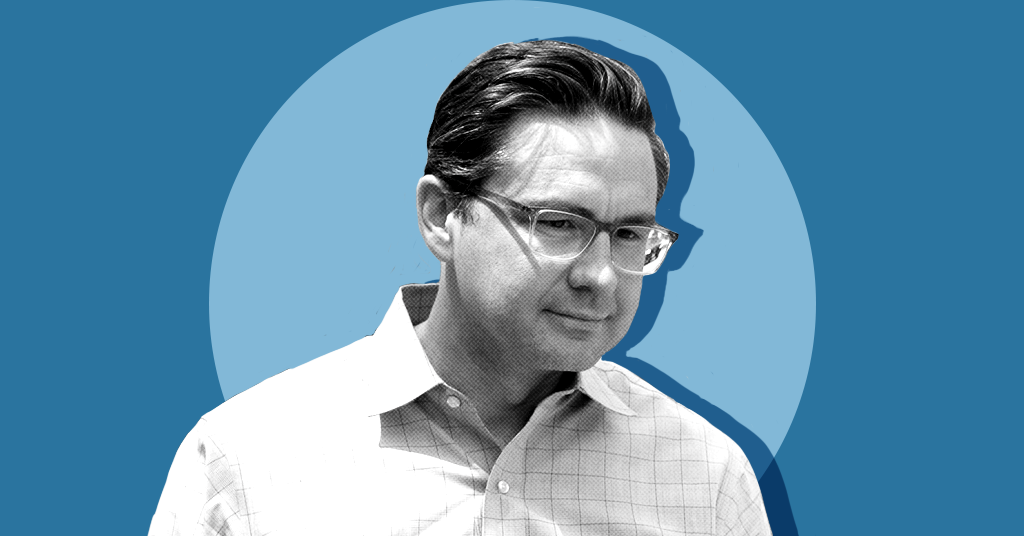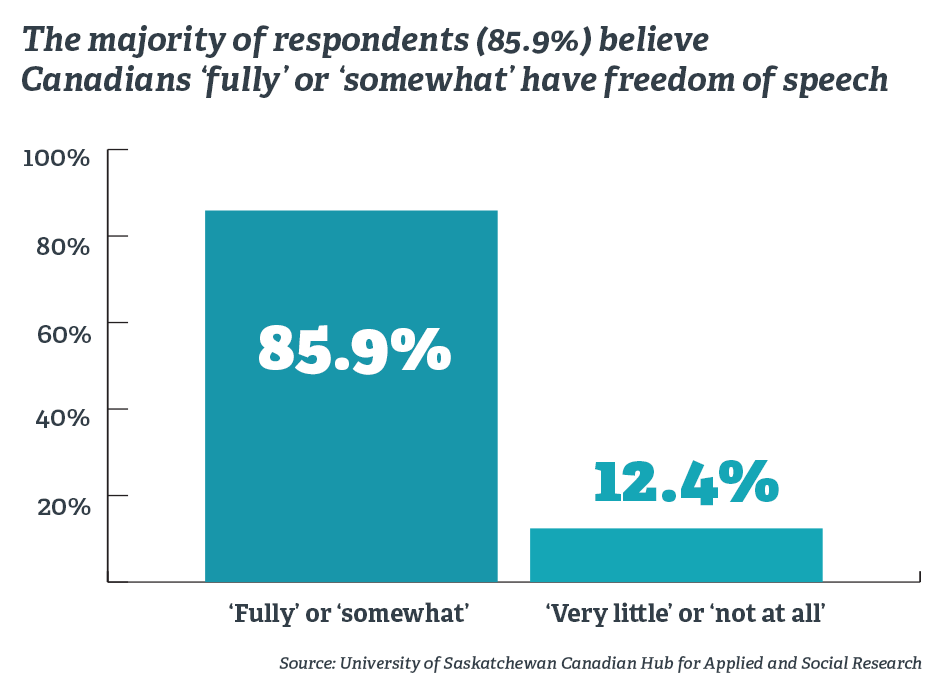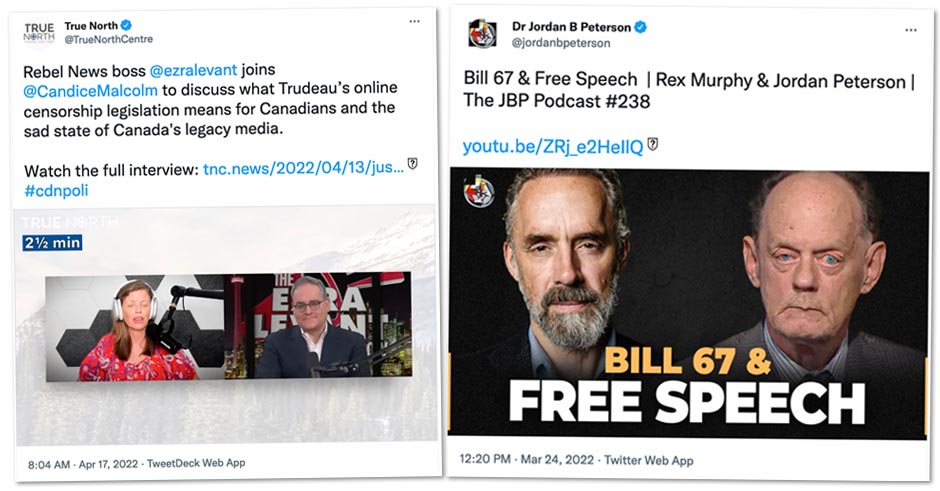
Only 1-in-10 Canadians Believe ‘Free Speech’ is in Crisis, Despite What Right-Wing Voices Claim
Three-quarters of Canadians want to see more action to crack down on hate speech, new research shows
New research suggests a lopsided majority of Canadians do not believe “free speech” is on the verge of disappearing in Canada, findings that pour a tall glass of cold water on claims promoted by Pierre Poilievre and right-wing media sources.
According to a new survey released by the University of Saskatchewan’s Canadian Hub for Applied and Social Research, the belief that “freedom of speech” is in crisis appears to be a top-of-mind concern for a very small – but very loud – minority of Canadians.
Only 12.4% of respondents said they believe Canadians have little to no “freedom of speech” – by contrast, more than eight-in-ten Canadians take a less catastrophic view.
“The majority of respondents (85.9%) believe Canadians fully or somewhat have freedom of speech,” the USask survey states.

Graphic: PressProgress
“We decided to ask about freedom specifically, given (Conservative leadership candidate) Pierre Poilievre’s campaign focus on the word and other recent events,” USask researcher Jason Disano explained in a release. “It would be relevant to find out if people truly feel free, as opposed to the rhetoric coming out of campaigns.”
The research does suggest some noteworthy regional differences – while anxieties over “freedom of speech” were lowest in Atlantic Canada and Québec, nearly one-in-five (18.5%) respondents in the Prairies said they felt they have little to no free speech.
Even then, four-in-five people (81.1%) in Alberta, Saskatchewan and Manitoba do not share the same anxieties over the state of free speech in Canada.
One explanation is that these anxieties are concentrated among conservatives, with one-quarter (24%) of respondents who identified as “very right leaning” indicating they believe Canada has “little or no freedom of speech.”
And despite right-wing panics over “academic censorship” and so-called “cancel culture,” the survey similarly suggests only a tiny minority of Canadians (7.3%) feel “very uncomfortable” with expressing political opinions in public.
By contrast, “three-quarters of respondents feel comfortable expressing their political opinions in public” compared to less than one-quarter who expressed some discomfort.

The research also reinforces a number of recent surveys showing an overwhelming majority of Canadians support taking action to crack down on hateful speech: Three-quarters of respondents (72.9%) said they want support stronger government action against hate speech while two-thirds (68%) want private corporations, such as social media platforms, to crack down on hate speech.
Those results are consistent with other research into public opinion on the topic says Mohammed Hashim, Executive Director of the Canadian Race Relations Foundation.
“Canadians understand that hate speech is wrong and rightfully deemed unlawful in Canada,” Hashim told PressProgress.
“This study reinforces that a significant majority of Canadians believe that both the government and private corporations should do their part to limit the spread of hate speech.”
A 2021 poll commissioned by the CRRF found about eight-in-10 Canadians support the federal government taking various actions requiring social media companies to remove hateful and racist material on their newsfeeds.
“As our own research has demonstrated, hate speech limits the right to freedom of expression of those most likely to become targets of hate,” Hashim said. “Exaggerated concerns that regulations will erode our constitutional freedoms are misplaced and out of step with what Canadians have repeatedly made clear: Hate speech has no place in our democratic society.”
Evan Balgord, Executive Director of the Canadian Anti-Hate Network, found similar results when his organization polled Canadians on their views about online hate.
“Consistently we’re finding that a pretty big majority of Canadians support doing something about hate speech online,” Balgord told PressProgress, adding that the results of the USask survey track with his own observation that much of the opposition to these efforts is largely coming from a “very loud and vocal minority” heavily influenced by right-wing culture war politics.
“Free expression has become part of the culture war that really animates the far-right, so you have a very, very vocal minority,” Balgord said. “You can see who is banging the drum around free expression, and often times they’re not people who genuinely care about free expression, they’re people who are very hypocritical about it.”
Pierre Poilievre is proposing a “massive government intrusion” into academic freedom, academics warn.
Academics say Poilievre’s plan does little to address real threats to academic freedom and sounds like something out of “North Korea.”https://t.co/YUxS7FWciz #cdnpoli #canlab
— PressProgress (@pressprogress) June 24, 2022
In Canada, Balgord said bad faith actors, including “pseudo-journalism outlets” and “politicians of various stripes,” routinely exaggerate threats to free speech and seek to exploit these for political and financial gain as “hot button” culture war issues.
“It’s just a fantasy” that “far-right fake news has invented,” Balgord said.
But Balgord admits it’s becoming harder to discuss “free speech” because the concept increasingly “means different things to different people.” While civil libertarians and other good faith actors may bring forward “genuine” issues of concern, the “free speech absolutism” promoted by a “very small number of people who already believe we don’t have free speech” effectively “prioritizes Nazis over people of colour.”
“People issuing hate speech are rarely real believers in free speech, they just want to be able to do what they want and hurt people, they don’t want their speech to have any consequences, whereas we know that hate speech silences women and people of colour and LGBTQ+ persons and makes it harder for them to participate in society and have freedom of expression for themselves,” Balgord said.
“Hate speech is terrible for free speech.”
Our journalism is powered by readers like you.
We’re an award-winning non-profit news organization that covers topics like social and economic inequality, big business and labour, and right-wing extremism.
Help us build so we can bring to light stories that don’t get the attention they deserve from Canada’s big corporate media outlets.
Donate



